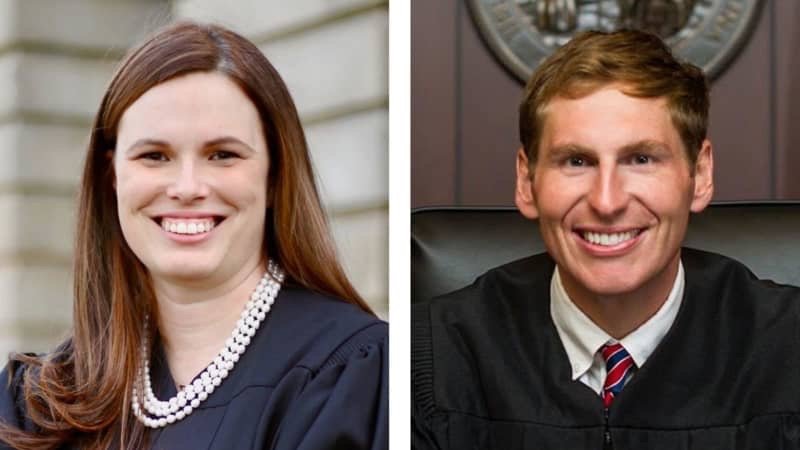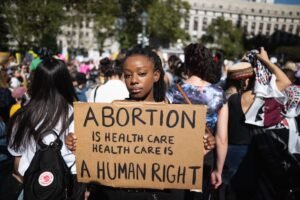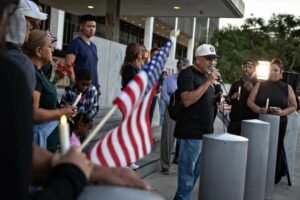In a high-stakes legal battle with significant implications for democracy in North Carolina, a federal judge has handed the contentious challenge over more than 60,000 ballots cast in the state’s Supreme Court election back to the North Carolina Supreme Court. The ruling by U.S. District Judge Richard Myers—a Trump-appointed federal judge—positions the GOP-majority state court to potentially overturn election results, a move that could unseat Democratic incumbent Allison Riggs in favor of Republican challenger Jefferson Griffin.
The decision is seen as a procedural victory for Griffin and a controversial step that raises alarms about the politicization of election integrity. With Riggs currently leading Griffin by a razor-thin margin of 734 votes after two recounts, this case underscores the fragility of democracy and the power of state courts in determining election outcomes.
What’s at Stake
At the heart of this case is Griffin’s claim that tens of thousands of votes were illegally cast by ineligible voters. His sweeping legal challenge has drawn widespread scrutiny, particularly for its disproportionate impact on Black voters. A News & Observer analysis found that Black voters were twice as likely as white voters to have their ballots challenged. Among those caught in the crosshairs of Griffin’s allegations are state lawmakers, election officials, and even Riggs’ parents.
The most far-reaching of Griffin’s arguments contends that voters who lack a driver’s license number or Social Security number in the voter database should not have been allowed to vote. Election officials, however, have countered that such omissions are often administrative errors and no fault of the voters themselves. The State Board of Elections, led by a narrow Democratic majority, dismissed Griffin’s challenges last month, but the Republican candidate quickly escalated the matter to the courts.
Griffin’s insistence on challenging these ballots reveals a broader strategy that aligns with recent Republican efforts to question election results and undermine voter confidence—an echo of controversies seen across the nation since 2020.
The Legal Backdrop
Judge Myers’ ruling to return the case to the state court is rooted in his interpretation of federalism. “Should a federal tribunal resolve such a dispute?” Myers wrote. “This court, with due regard for state sovereignty and the independence of states to decide matters of substantial public concern, thinks not.”
This deference to state authority places the outcome squarely in the hands of North Carolina’s Supreme Court, where Republicans hold a 5-2 majority. Riggs has recused herself from the case, further stacking the deck against her campaign. If the court sides with Griffin, the decision could nullify tens of thousands of ballots and reshape the election results.
Absent an injunction, the State Board of Elections could certify Riggs as the winner as early as January 10. Such a move would likely provoke further litigation and escalate tensions in an already fraught political climate.
Implications for Durham
This case is more than just a power struggle between two candidates—it’s a bellwether for voter rights and election security in North Carolina. Durham, a city that has historically championed progressive values and robust civic engagement, stands at the epicenter of this unfolding drama. With its majority-Black population and reputation as a stronghold of Democratic voters, Durham has much to lose if ballots are invalidated en masse.
Local leaders have voiced concerns about the precedent this case could set. “The implications for voter suppression are chilling,” said a Durham City Council member who wished to remain anonymous. “If a court can so easily toss out ballots, it undermines everything we stand for as a democracy.”
Durham’s activist community is also mobilizing. Grassroots organizations such as Democracy NC and the Southern Coalition for Social Justice are rallying to protect voting rights and ensure that every vote is counted. The Bull City Citizen will continue to provide in-depth coverage of these efforts, keeping Durham residents informed and engaged.
The Broader Context
This case exemplifies the increasing national trend of election-related litigation aimed at delegitimizing results unfavorable to conservative candidates. It also highlights the growing role of state courts in deciding election outcomes, often with partisan overtones. For North Carolina, a state already marked by contentious gerrymandering battles and voter ID laws, this case serves as a reminder of the fragility of democratic institutions.
For Durham, the stakes are personal. As a city that prides itself on its diversity and progressive ideals, this legal battle is a direct challenge to the values it holds dear. Regardless of the outcome, one thing is clear: the fight for democracy is far from over.
Stay Informed with The Bull City Citizen
At The Bull City Citizen, we are committed to delivering accurate, timely, and in-depth reporting on the stories that matter most to Durham and beyond. This case is a pivotal moment for our state and city, and we will continue to provide updates, analysis, and insight as the situation unfolds. Subscribe today to stay informed and support local journalism that puts our community first.












